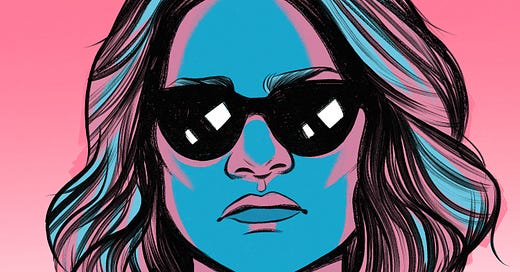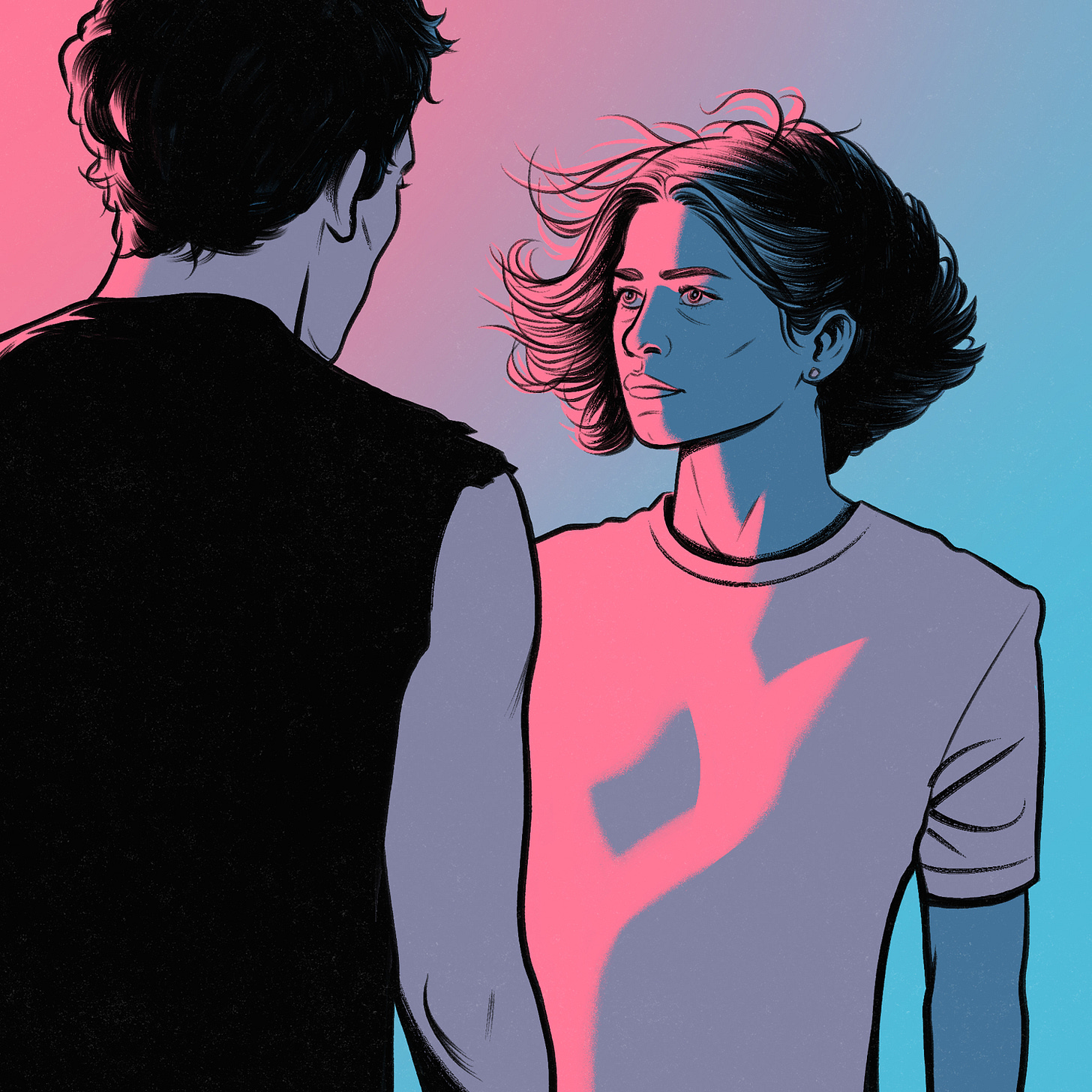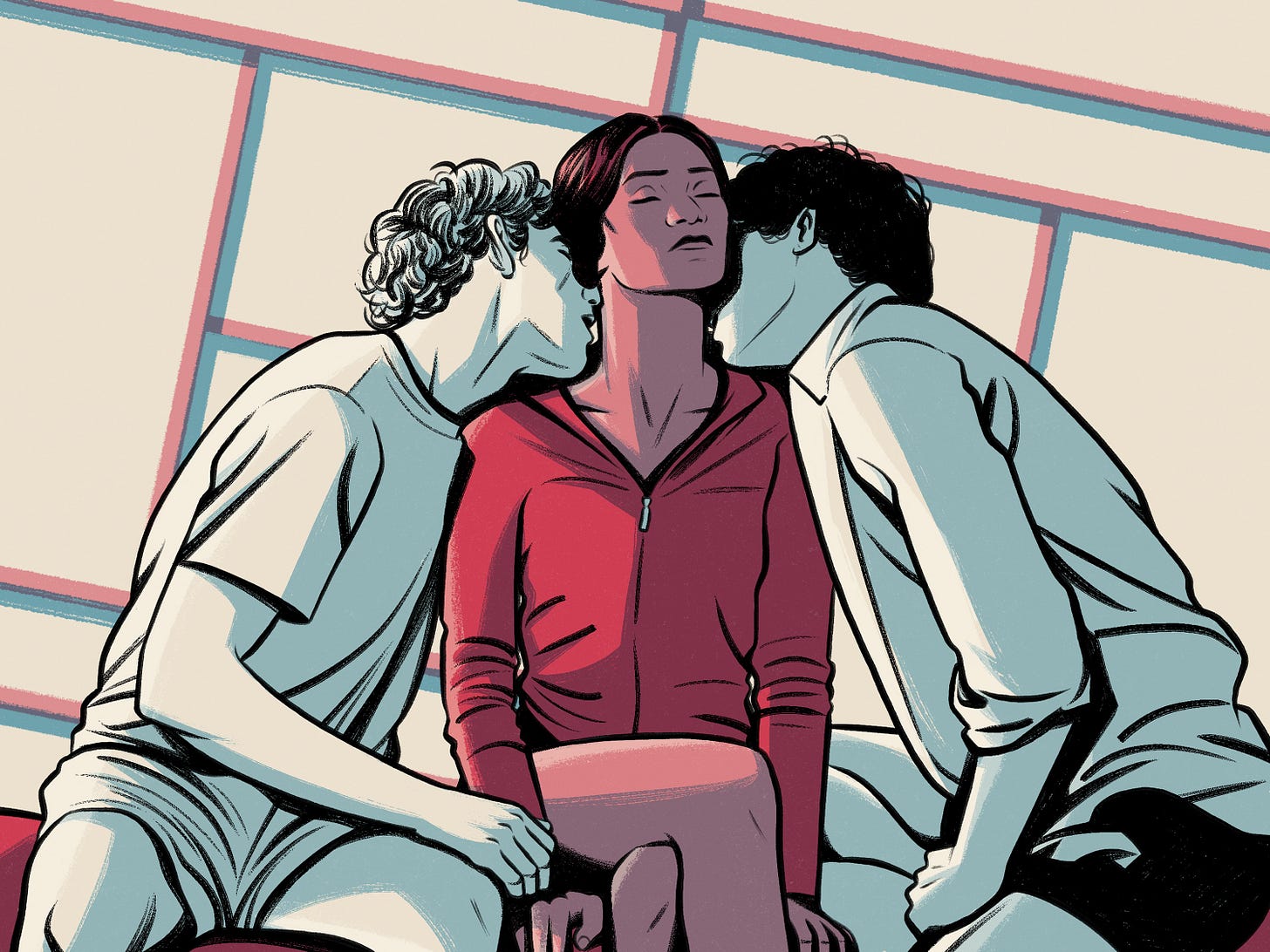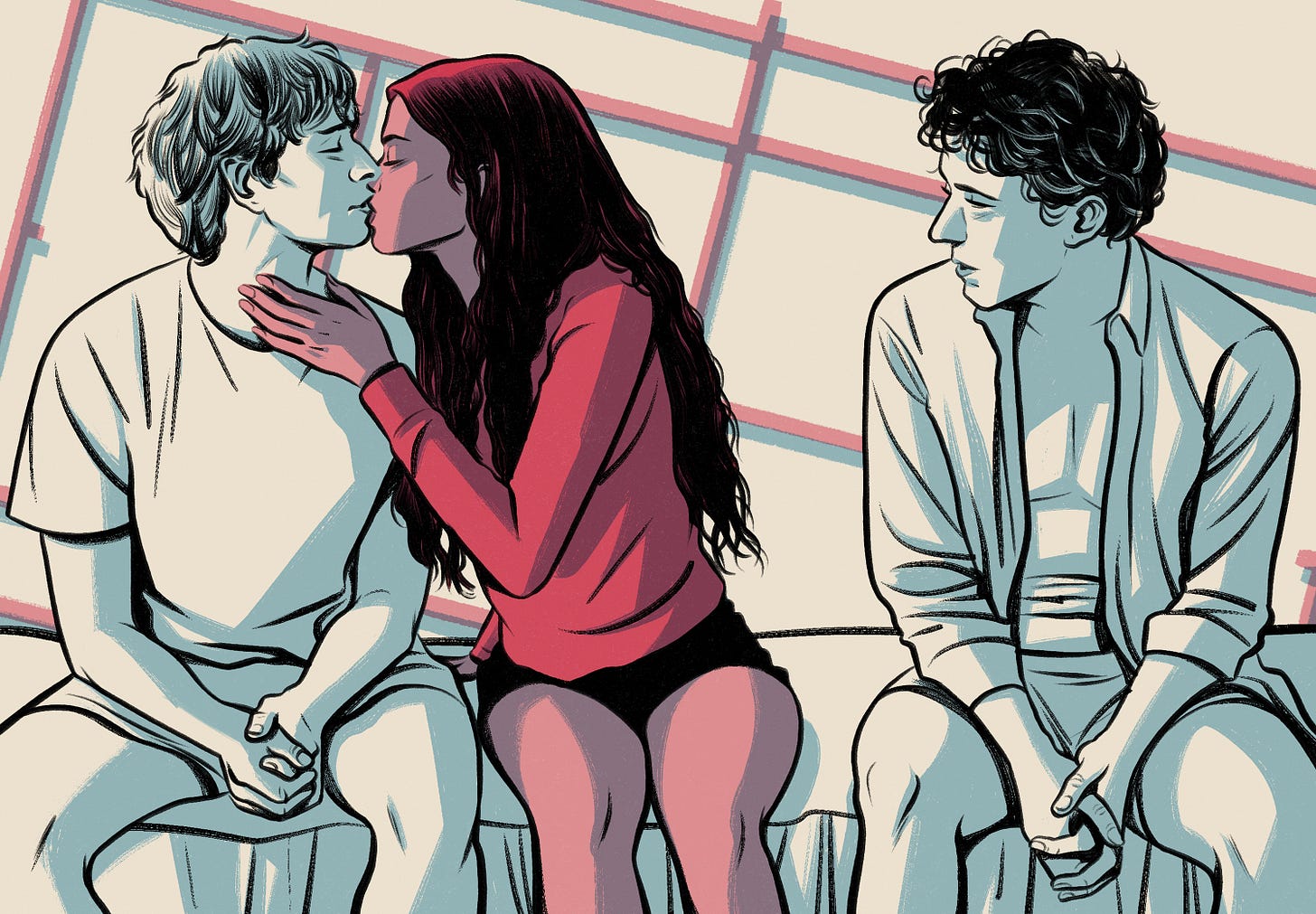“It's no accident, I think, that tennis uses the language of life. Advantage, service, fault, break, love, the basic elements of tennis are those of everyday existence, because every match is a life in miniature. Even the structure of tennis, the way the pieces fit inside one another like Russian nesting dolls, mimics the structure of our days. Points become games become sets become tournaments, and it's all so tightly connected that any point can become the turning point. It reminds me of the way seconds become minutes become hours, and any hour can be our finest. Or darkest. It's our choice.” - Andre Agassi (Open)
“Sports are just to keep your mind off everything else” - Rita Mae Brown
I suppose I need to apologise to baseball fans. I’m almost certain I’ve said something along the lines of “I love Moneyball but I couldn’t give less of a shit about baseball” in the past. And so, with Challengers (Dir. Luca Guadagnino, 2024) in cinemas this week, I now can’t move for reviewers offering their casual indifference, or outright antipathy, towards tennis. A sport I love.
I get it. I hate most other sports. I want every golf course in the UK to be nationalised and turned into public parks and/or social housing.
Challengers began life - according to screenwriter and playwright Justin Kuritzkes - while he watched the now infamous 2018 US Open Women’s final between Serena Williams and Naomi Osaka. It was one of those times that tennis made its way into mainstream news coverage. Suddenly everyone had an opinion about the No Coaching rule. There was a lot of misogynoir directed towards Williams, and a lot of infantilization of Osaka. It was a sad, infuriating, slow motion disaster.
The controversy hinged on a moment where William’s coach was giving hand signals from the stands, encouraging Serena to approach the net. This goes against a rule that prohibits coaching during a match, and so Serena was given a code violation. Things escalated quickly from there, but this moment itself was enough to intrigue Kuritzkes:
“Immediately that struck me as this very cinematic dilemma, where you’re playing this incredibly high-stakes match, and there’s this person watching who’s the only person in the whole stadium who understands exactly what you’re going through and for whom the match matters as much as it matters to you. And yet, you can’t say anything to this person. I had this kernel of an idea right then, which was, what if you really needed to have an important conversation with this person? What if there was something the two of you really needed to work out right then?” - Justin Kuritzkes
This speaks, I think, to one of the things that made me fall in love with the sport. Tennis is lonely. The only other person who understands the specific pressure, isolation, heartbreak and pain of a tennis match is usually on the other side of the net. Someone you have to understand inside and out in order to beat them. That very specific relationship between the players is ripe for psycho-sexual narrative drama and it gave me immense pleasure to finally see a film like Challengers embrace it with such messy, horny enthusiasm.
Kuritzkes also took inspiration from Agassi’s story. Andre Agassi, a former world number one, dropped to a ranking of 141 in the world and so his coach, Brad Gilbert, convinced him to return to the Challengers Tour to rebuild his confidence. It’s such a perfect setting for a story like this - pregnant with dramatic possibilities - with immediately comprehensible stakes and balances of power that shift like sand under your feet.
Anyone who has read Lionel Shriver’s Double Fault (good book, awful person) will also be familiar with the beats of a story about a toxic tennis marriage.
“Tennis is like sex… Thrusting across the net - the ball is just a medium, a messenger of love and loathing all rolled up in one… Listen to the language!…sweet spot, throat of the racquet. Dish and shank, stab and slice… and penetrate - it’s pornographic… Approach and hold, break, break back, stroke… and connect - it’s romantic.” - Lionel Shriver (Double Fault)
Challengers agrees. Luca Guadagnino’s camera is the thirstiest, horniest little sex gremlin in cinema. With an equal opportunities gaze. No single person or inanimate item in a Guadagnino film is above being objectified. And yet, for a film that is all about slow motion, loving close-up shots of ears, necks, thighs, and pouring sweat - the film, like Call Me By Your Name, is surprisingly coy about the act of sex itself. For me, that’s a feature, not a bug. Guadagnino’s films are about desire, attraction and seduction - you don’t break that tension for the audience, you hold it.
“In tennis you stand face-to-face with the enemy, trade blows with him, but never touch him or talk to him, or anyone else. The rules forbid a tennis player from even talking to his coach while on the court. People sometimes mention the track-and-field runner as a comparably lonely figure, but I have to laugh. At least the runner can feel and smell his opponents. They're inches away. In tennis you're on an island. Of all the games men and women play, tennis is the closest to solitary confinement.” - Andre Agassi (Open)
In a way it’s a perfect sport for Guadagnino to tackle. Tennis is all about repression. Don’t touch, don’t think, don’t act. React. Forget that last point. Focus on the here. On now. Nothing else matters. Repress, repress, repress.
There’s an absurdity to Challengers. Guadagnino plays it all as high intensity, high camp melodrama. This approach will no doubt be off-putting to others, but it speaks to me - speaks to my love of the sport and the messy characters who inhabit it.
Because tennis is absurd. Sport is absurd. It’s all made up. Reverend Edward Thring largely invented football to get men to stop masturbating. None of it really means anything. Or rather, it means what we allow it to mean. But it's also life and death. The prize money can change someone’s future. A win here or a loss there can mean the difference between fame or obscurity. It is everything and nothing. It is absurd.
“Are we talking about tennis now?” - Patrick Zweig
“We’re always talking about tennis.” - Tashi Duncan
Trent Reznor and Atticus Ross got that memo. Their scores are always a delight but their Challengers score is a particular favourite. Pounding, rhythmic trance music and bathetic (complementary) piano motifs… It’s a rush of blood to the head. Pure adrenaline. Appropriately enough, in some scenes, the sound mix favours the score over the dialogue, letting it overwhelm the senses like a heartbeat gone wild.
I love that choice. As I did the way the sound design made the act of hitting a ball sound so violent and brutal. Robin Williams once described tennis as “chess at 90 miles an hour” and I think sometimes, when watching it from the TV angle high above the court, it’s easy to forget the 90 miles an hour bit.
No doubt Guadagnino overplayed his hand with the bathos at times. I’m not sure we strictly needed galeforce winds throwing everything around as the characters do the same with their lives. But if you’ve read Suzanne, you’ll know I can’t be mad at someone using weather bathetically to accentuate a character moment in a tennis story. It’s also a film which is constantly, relentlessly, doing too much. To complain about any one moment of that feels churlish.
“You’re playing percentage tennis. You’re waiting for me to fuck up.” - Patrick Zweig
Ask any tennis player or fan about their favourite or least favourite players and you’re likely to get a detailed, passionate breakdown of a player’s style. The way someone plays says so much about their personality, their ambitions and what we ourselves are attracted to/what repels us. Some players love to go for winners when they shouldn’t, some love to play cat and mouse tactical games, and some like to be a wall. It doesn’t have to look pretty, they just need to get that ball back across the net and hope that you won’t. If you’re feeling generous, this is referred to as counter-punching. If you’re the player on the other side of the net, you’ll probably mutter “pusher” under your breath and smash a racquet. It’s playing it safe - going for the shot that’ll land in 80% of the time, making the other player find a winner - and hoping they push too hard. I adore this film for having a line about percentage tennis.
“I tell my friend that tennis is boxing. Every tennis player, sooner or later, compares himself to a boxer, because tennis is non-contact pugilism. It’s violent, mano a mano, and the choice is as brutally simple as it is in the ring. Kill or be killed. Beat or take your beat-down. Tennis beatings are just deeper below the skin. It leaves no outer bruises.” - Andre Agassi (Open)
As someone who spent a lot of time thinking about how to visualise tennis in a different medium, I appreciated watching Guadagnino throw the kitchen sink at it in the final act. Every film about tennis has struggled with capturing the joy of watching a tennis match in real life and this probably came the closest to it. Mount a camera on a tennis ball Luca, have fun!
While I’ve seen tennis fans complain about the mis-timed speed of the cgi balls, or some of the technical aspects of the actor’s strokes, I have little interest in all that nit-picking. I watch plenty of tennis at home, I didn’t come to the cinema to watch a realistic tennis match.
Minor spoilers in this italised section in case you want to avoid those.
At match point, the Reznor/Ross thudding Euro trance kicks back in as we watch a player, in slow motion, change their serving style and I giggled in my seat. Structurally, maybe I anticipated it, but My God the audacity of that audiovisual juxtaposition. I wanted to stand up and applaud.
Despite the high stakes context of the final match/sex scene, it’s telling that the characters seem to be going through the motions. The present day incarnations of the trio are performing an interest in tennis (not tennis) - performing passion, performing virility, performing love, performing devotion. But they can’t delude themselves or each other. As Mike Faist’s Art prepares to serve, the characters share knowing smiles. Here, at last, the performance is over.
Forget the last point. This one, right now, is real.
"By the time I was thirteen I was madly in love. It was a blinding, choking, loyal love, filled with devotion and dedication. Obvious to all, it was understood only by a few." - Pancho Gonzales (talking about his tennis racquet)
Stray Thoughts
Seeing as all cinematic girlfriends of Spider-Man are contractually obligated to appear in a tennis film, Zendaya chose the best one.
One more Agassi quote from the end of Open (an essential read, even for non-tennis fans), talking about playing with his wife Steffi Graf for the first time:
“A ball feels different off every player’s racket - there are minute but concrete subtleties of force and spin. Now, hitting with her, I feel her subtleties. It’s like touching her, though we’re forty feet apart. Every forehand is foreplay.” - Andre Agassi (Open)
Even though I appreciate most stories about relationships involve a third, it’s hard not to want to read into the fact that Celine Song’s partner also wrote about a love triangle and paths not taken.
Links
I illustrated Anna Bogutskaya’s latest newsletter about Challengers. Anna liked the film a lot less than I did, but it’s - as always - a great read. I had a couple of passes at the illustration so I’ll include both below:
The latest episode of the No Challenges Remaining podcast has a great interview with screenwriter Justin Karitzkes where they get into his interest in tennis, the challenger tour, and all sorts of nerdy tennis details.
Host of the NCR podcast - Ben Rothenberg - wrote this piece about the Cincinnati Applebees that most tennis players frequent after late matches at the tournament. Which then led to a scene in Challengers being set there.
My favourite sports writer - Louisa Thomas - is always worth a read, but this piece about the 2018 Serena/Osaka match that inspired Challengers is a good primer if you need more context about that match.
If you loved Challengers and would like more stories about tennis (that aren’t really about tennis), can I be gauche and recommend my own graphic novel? Suzanne is principally about Suzanne Lenglen, the most successful tennis player of the 1920s. But its also about the birth of the 20th Century, the mental and physical tax of success, the invention of sport, and finding love on the court.
Another plug that I feel embarrassed about: I’m taking part in The May 50k - trying to run 50k in May to raise money for MS research. I hate asking for donations to it, but I recognise that if no-one sponsors it, the whole endeavour is pointless. So if you’re in a position to donate a small amount to it, my page is here. I probably should have put this at the top, instead of at the bottom of a 2,000+ word piece about tennis that no-one will get to the end of.








